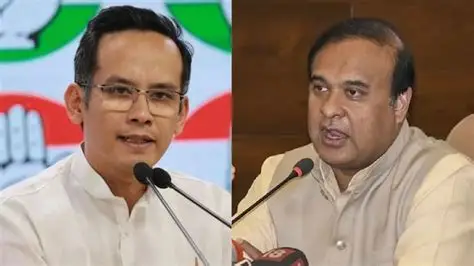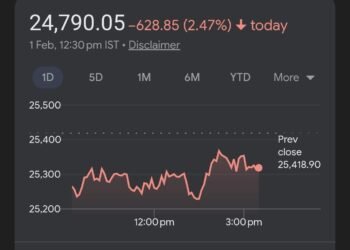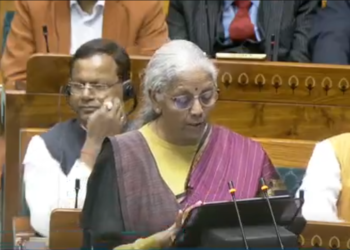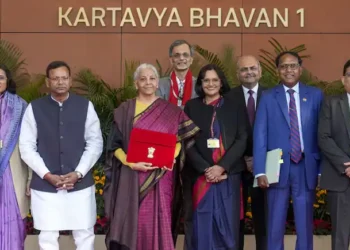Gaurav Gogoi has positioned the party as a defender of council autonomy, accusing the BJP of “remote-controlling” tribal affairs from Dispur and overriding the very spirit of constitutional decentralization.
By Navin Upadhyay
July 2025-With just months to go before the Assam Assembly elections, a resurgent Congress is recalibrating its political strategy to focus squarely on the state’s tribal heartland. Internal post-poll surveys reportedly show a narrowing gap between the Congress and the ruling BJP, especially in constituencies falling under the Sixth Schedule autonomous councils. Against this backdrop, the Congress is intensifying its tribal outreach, framing itself as a defender of constitutional autonomy and local self-governance — two areas where tribal disillusionment with the Himanta Biswa Sarma government appears to be growing.
At the center of this emerging political narrative is Congress leader and Assam Pradesh Congress Committee (APCC) president Gaurav Gogoi. During a recent visit to Diphu, Gogoi launched a scathing attack on the BJP-led state government, accusing it of “remotely controlling” autonomous councils like the Bodoland Territorial Region (BTR), Karbi Anglong, and Dima Hasao from Dispur. He alleged that Chief Minister Himanta Biswa Sarma had turned the Sixth Schedule — a constitutional provision meant to guarantee autonomy to tribal regions — into a “hollow framework.”
“Those entrusted with safeguarding the spirit of the Sixth Schedule have instead surrendered it. All real control now resides with Dispur,” Gogoi said, speaking at a packed press conference in Diphu.
Political Interference, Land Anger Fuel Discontent
Beyond abstract questions of constitutional fidelity, what has made this issue politically combustible is the growing tribal anger over land deals allegedly benefitting corporate interests. Gogoi and other Congress leaders have accused the Sarma government of bypassing local councils and pushing ahead with controversial land transfers to industrial conglomerates like the Adani Group — including proposals for thermal and cement plants in tribal lands.
READ: pinion: India Can’t Stay Neutral on Dalai Lama’s Succession
For tribal communities in the hill districts, land is not just a resource but a marker of identity and autonomy. Congress strategists believe that these economic anxieties, when paired with the perception of administrative disempowerment, have created fertile ground for a political shift.
The Environment Ministry has flagged gross violations of forest law by Assam’s top forest official – diverting protected land without Central clearance, despite repeated warnings from MoEF and the NGT. Yet the state government rewarded him with two extensions.
When the law is…
— Gaurav Gogoi (@GauravGogoiAsm) July 3, 2025
“The people of these regions should have the authority to make decisions regarding their own development,” Gogoi emphasized. “Today, local councils are disempowered. The Chief Minister is making all decisions unilaterally. The future of the tribal people is now dictated by remote-controlled directives.”
A Return to Decentralization as Political Theme
In drawing a contrast with the current administration, Gogoi invoked the legacy of his father, late Chief Minister Tarun Gogoi. He credited his father with establishing and empowering several autonomous and development councils — such as those for the Rabha and Thengal Kachari communities — through consensus and consultation with local leaders.
“Tarun Gogoi prioritized decentralization even at the cost of political expediency. But today, decisions are centralized and imposed from the top,” Gogoi said.
The Congress now hopes to capitalize on that legacy. A senior APCC functionary confirmed that the party has already begun holding consultations in tribal areas to draft a tribal rights charter ahead of the 2026 elections. This will include proposals to protect Sixth Schedule autonomy, ensure land rights, and boost financial grants to autonomous councils.
Weak Tribal Leadership Under Fire
Gogoi didn’t spare current council leaders either, accusing them of being passive enablers of the state government’s “centralization drive.” He lamented that even leaders from other political ideologies had failed to resist arbitrary land transfers and resource allocations from Dispur.
“We want strong and assertive council leaders. They must rise above party lines to safeguard their communities. But today, they seem content to merely echo the Chief Minister’s orders,” he said.
Political analysts see this critique as a shrewd move to create divisions within the BJP-aligned local leadership while positioning Congress as the only party willing to confront the erosion of tribal rights.
READ: Biren Singh No Longer a VVIP: Escort, Staff, CID Units Recalled
READ: Manipur: Suspension of Operations Pact Set for Extension with Tighter Checks
READ: Burnt Homes, Broken Trust: Manipur’s Unrealistic Relief Plan
If the Congress manages to reclaim even a portion of the tribal vote that helped propel BJP to victory in 2021, it could significantly alter the electoral map. The autonomous council areas collectively account for over two dozen Assembly seats — many of which were narrowly lost by the Congress last time.
The political stakes are high. For the BJP, maintaining its grip on the tribal regions is essential to preserving its Assam stronghold. For the Congress, it represents the clearest path to a statewide comeback.
Gogoi has already announced a series of protests and public meetings across the BTR, Karbi Anglong, and Dima Hasao to “mobilize constitutional resistance” against what he calls the “remote-control regime” of the BJP. How this tribal gambit plays out may well determine the outcome of the 2026 Assembly polls — and redefine the trajectory of Assam’s regional politics.
📊 VoteVibe Opinion Poll: Assam 2026 Assembly (June 30, 2025)
- Anti-incumbency against CM Sarma/BJP stands at 50.5%, with a sharp 56% of 18–24-year-olds expressing dissatisfaction
- Regarding MLAs, 75% of respondents want their current MLA replaced, indicating vast potential for electoral churning.
- Only 15% said they were satisfied with their sitting MLA, highlighting widespread discontent
Analytical Takeaway:
This isn’t just a wave against the CM or the BJP—it’s a grassroots call for change. The high desire for new MLAs signals vulnerability across rural and tribal constituencies, where dissatisfaction with local governance runs deep.
🔍 Tribal Voter Dynamics & Emerging Anger
- Tribal regions under the Sixth Schedule (BTR, Karbi Anglong, Dima Hasao) show stronger anti-incumbency than the statewide average, driven by:
- Perceived overreach by Dispur into council autonomy.
- Fury over land transfers to private corporations like Adani for unconsulted industrial projects.
Congress’s focus on reclaiming tribal trust aligns with this rising sentiment: protesters in hill districts describe decisions as “remote-controlled directives” from Dispur, reinforcing deep alienation.
⚖️ Why This Matters for Congress
- Tight overall poll dynamics, with anti-incumbency ~50%, point to swing seat opportunities.
- Tribal regions (25–30 assembly seats) could swing with consolidated tribal sentiment—potentially pivotal in a close contest.
- Congress’s tribal charter, emphasizing Sixth Schedule autonomy, land security, and local empowerment, directly addresses key grievances highlighted by surveys.













